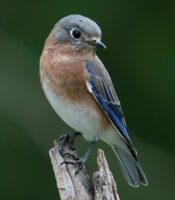– by Bet Zimmerman
 Getting involved in bluebird conservation is challenging and incredibly rewarding. But there is a downside. Nobody warns you that despite all the joy, there is bound to be some heartache. The more you grow to care for these birds, the more it hurts when something goes wrong. It can also get expensive and time consuming.
Getting involved in bluebird conservation is challenging and incredibly rewarding. But there is a downside. Nobody warns you that despite all the joy, there is bound to be some heartache. The more you grow to care for these birds, the more it hurts when something goes wrong. It can also get expensive and time consuming.
You wait and wait for nesting season to start, searching the skies for that flash of blue. Maybe you see no bluebirds at all – one trail monitor waited 13 years before a successful bluebird nesting. Or bluebirds do check out your boxes, and then decide to nest elsewhere. They start a nest and abandon it for some unfathomable reason. A pair lays a nest full of lovely blue pearls, but not one hatches.
Although your first attempts are filled with anticipation, like all those who came before, you will make mistakes. You probably don’t know about the resources and experienced bluebirders out there who have already learned things the hard way and are eager to help you.
Clueless, you put up that first box. Maybe you nail it to a tree or don’t put a baffle on and inadvertently provide a meal to a marauding raccoon.
Responsible bluebird landlords monitor nestboxes. But one bird builds their nest right up against the slanted door of a Peterson box, and when you open the door, every egg tumbles to the ground and breaks before your disbelieving eyes.
You open a box eagerly expecting to see gaping nestlings. Instead you find corpses, the victims of a House Sparrow attack or a spate of nasty weather. Or you experience the shock of a snake coiled where the eggs or nestlings used to be. An entire clutch of eggs you expected to hatch that day are pecked and broken on the ground below the nestbox, as a result of a House Wren visit.
You try to trap House Sparrows to protect the native birds you offer homes to, and end up with collateral damage when a non-target bird dies in the trap.
You feel helpless panic when confronted with a difficult situation where there may not be a “right” thing to do.
And then there are the sleepless nights. You worry whether the babies of a widowed parent will get enough food, whether a premature fledgling will be eaten by the cat your neighbor allows to roam free, or if the young ones will survive their first cold and rainy night out of the box. You run across the lawn in your underwear to chase away a hawk eyeing your mealworm feeder. You blubber like an idiot when the last little runt finally makes it to the safety of the trees.
A vandal destroys a box or sets off a firecracker inside it. You are sickened by what people are capable of.
It can even make you physically ill. More than one bluebirder has contracted Lyme Disease, or broken a body part falling in a hole or off a ladder.
Did I mention other predators and problems with ants, blackflies, blow flies, House Wrens, mice and rats, pesticides, squirrels, starlings, starvation, wasps, and hot weather, woodpeckers, bears, bees, jays, chipmunks, cowbirds, crows and ravens, disease and internal parasites, grackles, magpies, mites, opossums, owls, skunks and window strikes?
The more you care, the more it hurts when something goes wrong. That sad feeling of loss is painful. As Keith Kridler said, “I will guarantee that there is not a bluebirder that has not shed a tear or two either for the joy these birds bring or the heartache we occasionally feel depending on what we find or learn about these birds over the course of our lives! It hurts just as much to lose that first nest as it will the last nest, only you feel more guilty the longer you put up nestboxes because we “believe” we have learned enough to be able to prevent ALL losses!“
Bluebirding is a commitment. If you have a large trail, you can spend hours each week checking boxes and recording and reporting data. Even when it’s hot and humid, the bugs are after your blood, the grass is over your head, housework is piling up and other responsibilities beckon, you still need to get out there and monitor regularly during active nesting season.
It can get expensive too – nestboxes, mounting hardware, baffles, traps and mealworms and feeders all add up.
Some family and friends will tire of mealworms in the refrigerator and the seemingly endless bluebird blather. Strangers wonder whether you are an obsessed fanatic.
At the end of each season, you will literally experience the void left by “empty nest syndrome.” The babies you have watched over are gone, and you have to wait a whole year for the cycle to begin anew.
So in the end, is it worth it? ABSOLUTELY. You will experience unique excitement and intense happiness, learn much, witness awe on a childs’ face, and find wonderful new friends. And despite the mistakes, cost, time and inevitable tragedy, you will know that because of you, there is one more bluebird out there.
May all your blues be birds!
More Information:
- Also see Why We Get Goopy Over Bluebirds and Quotes Related to Bluebirding.
Remember, we are helping our Bluebirds and other native species battle the odds so that everyone can enjoy them for years to come.
– Larry Jordan, Bluebird_L, 2008
